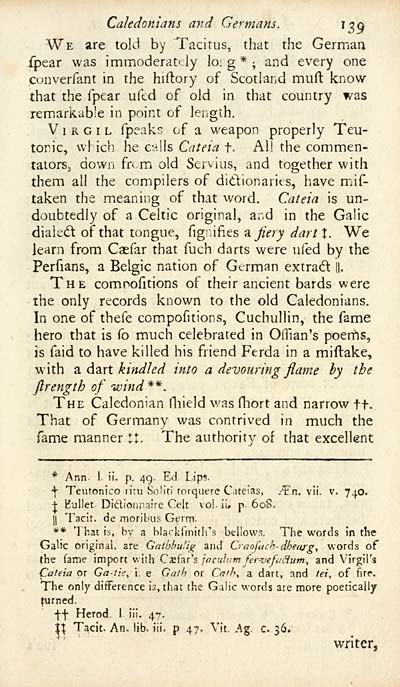Blair Collection > Critical dissertations on the origin, antiquities, language, government, manners, and religion, of the antient Caledonians, their posterity the Picts, and the British and Irish Scots
(177)
Download files
Complete book:
Individual page:
Thumbnail gallery: Grid view | List view

Caledonians arid Germans. i^o
We are told by Tacitus, that the German
fpear was immoderat-ly loi g * ; and every one
converfant in the hiftory of Scotland muft know
that the fpear ufed of old in that country was
remarkiibie in point of length.
Virgil fpeaks of a weapon properly Teu-
tonic, which he cmHs Cateia f. All the commen-
tators, down f n m old Servius, and together with
them all the compilers of didionarits, have mif-
taken the meaning of that vvord. Cateia is un-
doubtedly of a Celtic original, and in the Galic
dialed of that tongue, fig^ifies d. fiery dartX. We
learn from Caefar that fuch darts were ufed by the
Perfians, a Belgic nation of German extradt ||.
The comoofitions of their ancient bards were
the only records known to the old Caledonians.
In one of thefe compofitions, Cuchullin, the fame
hero that is fo much celebrated in OlTian's poems,
is faid to have killed his friend Ferda in a miftake,
with a. da.Yt kindled into a devouring flame by the
jlrength of wind **.
The Caledonian fliield was fhort and narrow ft.
That of Germany was contrived in much the
fame manner tl. The authority of that excellent
* Ann. I. ii. p. 49. Ed Lip?.
f Teutonico riru 8o!Iri torquere Cateias, ^n. vii. v. 7^0.
J Hullet. Didionnaire Celt vol. ii, p. 60S.
11 Tacit, de moribus Germ.
** That is, by a hlackfrnitirs bellows. The words In the
Galtc original, are GathhuH^ and Oaofach-dhearg, words of
the fame import with Cxfar's jncuhim fer-vefudum, and Virgil's
Cateia or Ga-tie, \ e Gath or C^'A, a dart, and tei, of firp.
The only difference is, that the Galic words are more poetically
furned.
ff Herod. I ill. 47.
\\ Tacit. An. lib. iii. p 47. Vit. Ag. C. 36.
writer,
We are told by Tacitus, that the German
fpear was immoderat-ly loi g * ; and every one
converfant in the hiftory of Scotland muft know
that the fpear ufed of old in that country was
remarkiibie in point of length.
Virgil fpeaks of a weapon properly Teu-
tonic, which he cmHs Cateia f. All the commen-
tators, down f n m old Servius, and together with
them all the compilers of didionarits, have mif-
taken the meaning of that vvord. Cateia is un-
doubtedly of a Celtic original, and in the Galic
dialed of that tongue, fig^ifies d. fiery dartX. We
learn from Caefar that fuch darts were ufed by the
Perfians, a Belgic nation of German extradt ||.
The comoofitions of their ancient bards were
the only records known to the old Caledonians.
In one of thefe compofitions, Cuchullin, the fame
hero that is fo much celebrated in OlTian's poems,
is faid to have killed his friend Ferda in a miftake,
with a. da.Yt kindled into a devouring flame by the
jlrength of wind **.
The Caledonian fliield was fhort and narrow ft.
That of Germany was contrived in much the
fame manner tl. The authority of that excellent
* Ann. I. ii. p. 49. Ed Lip?.
f Teutonico riru 8o!Iri torquere Cateias, ^n. vii. v. 7^0.
J Hullet. Didionnaire Celt vol. ii, p. 60S.
11 Tacit, de moribus Germ.
** That is, by a hlackfrnitirs bellows. The words In the
Galtc original, are GathhuH^ and Oaofach-dhearg, words of
the fame import with Cxfar's jncuhim fer-vefudum, and Virgil's
Cateia or Ga-tie, \ e Gath or C^'A, a dart, and tei, of firp.
The only difference is, that the Galic words are more poetically
furned.
ff Herod. I ill. 47.
\\ Tacit. An. lib. iii. p 47. Vit. Ag. C. 36.
writer,
Set display mode to: Large image | Transcription
Images and transcriptions on this page, including medium image downloads, may be used under the Creative Commons Attribution 4.0 International Licence unless otherwise stated. ![]()
| Permanent URL | https://digital.nls.uk/76288558 |
|---|
| Description | A selection of books from a collection of more than 500 titles, mostly on religious and literary topics. Also includes some material dealing with other Celtic languages and societies. Collection created towards the end of the 19th century by Lady Evelyn Stewart Murray. |
|---|
| Description | Selected items from five 'Special and Named Printed Collections'. Includes books in Gaelic and other Celtic languages, works about the Gaels, their languages, literature, culture and history. |
|---|

